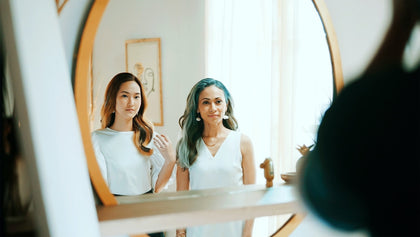Whether you love it or hate it, gray hair is part of the cycle of life. But is there an average age for getting those silver strands? That’s a complex question that deserves a thorough answer. Read on to find out more about the process of going gray, including premature graying and why it happens. Also, find out what products you should use to control gray hair naturally.
When Do People Usually Get Gray Hair?
To understand when people usually get gray hair, it's important to first understand why hair turns gray in the first place.
Once a hair follicle produces hair, the color of the hair is established and set. Over the years, however, due to aging, hair follicles begin producing less color, which is also known as a reduction of melanin. So when the hair goes through the natural cycle of dying and regenerating, it’s more likely to grow in as a gray hair beginning after age 35.
But aging isn't the only reason people's hair turns gray. Other factors, such as stress, nutrition, illness, genetics and certain environmental factors, can also play a role in people graying earlier than usual.
Shop: GRO AGELESS Collection for Graying Hair
The Average Age for Hair to Turn Gray
So what's the average age that people get gray hair? More than one study has found that the average age of onset is around 40, no matter if you are male or female. However, the age that hair graying happens to each individual person can vary.
Does Race Play a Role in When Hair Turns Gray?
Yes, race can play a role in the average age someone's hair might turn gray. After studying information in 69 different publications about hair aging between different races and ethnicities, a group of doctors and scholars found that the average age of hair-graying onset varies according to race:
- Caucasians: Occurs in mid-30s
- Asians: Occurs in late 30s
- Africans: Occurs in mid-40s
See Also: These Are the Characteristics of Aging Hair
Factors That Can Cause Hair to Turn Gray
Now that you know more about the average age that hair turns gray, here are the various factors (besides aging) that can contribute to someone going gray sooner rather than later.
Stress
There’s an age-old adage not to be too stressed or your hair will turn gray (or white). And it turns out there's some truth to it: While your hair won't turn white overnight, stress can play a role in turning individual hairs gray. The good news is gray hair from stress is often reversible.
Genetics
Family history can also be a great indicator of when you might find your first gray hair — and it might occur much earlier than the average age of onset graying. Due to genetics, some people tend to get gray hair around the same time as their family members. (Thanks, mom and dad.)
Health Issues
While going gray at a young age isn't always a cause for concern, premature graying might be a sign of a medical or health concern.
In certain cases, premature graying can be a flag for conditions like vitiligo (where skin loses its pigmentation) or pernicious anemia (where the body has difficulty absorbing vitamin B-12). Other possible conditions can include pituitary gland issues and thyroid issues.
Shop: GRO AGELESS Gray Delay Hair Supplement
Environmental Factors
Other things that might result in premature graying include certain environmental factors such as smoking, exposure to air pollutants and exposure to ultraviolet rays, which all can induce oxidative stress.
Vitamin Deficiencies
Vitamin deficiencies can also cause hair to go gray earlier. One study found that deficiencies in vitamin B-12, folic acid and biotin can contribute to premature graying.
Related: 9 Biotin-Rich Vegan Foods to Eat for Healthy Hair
#include-related-slider#
Going Gray Can Affect Self-Image
No matter whether the graying process is the result of health, genetics, nutrition, oxidative stress or the natural aging process, it can wreak havoc on one's self-esteem. Healthy hair is widely considered a sign of youth, and hair often serves as an aesthetic tool and form of non-verbal communication. According to the National Institutes of Health, hair color and style can significantly alter the appearance of a person, so when hair is graying, it can affect a person's self-image and body image.
So this begs the question: What can you do if your hair follicles are betraying you?
There's No Shame in Coloring Your Hair
If you're just not ready to lean into the silver sparkle, there is absolutely no shame in coloring your hair or blending your gray. Have fun creating a new look with your stylist. The trick is learning how to care for your hair as you age, so it can be as healthy as possible.
Related: How to Care for Your Hair in Your 40s
Consider a Natural Approach
The belief that gray hairs can spontaneously return to their normal color has been around since the 1970s when one researcher encountered a woman whose hair was gray on the ends but dark at the roots. That means that gray hair can be reversible in some cases.
"Only about 30% of what causes gray hair is determined by genetics — the rest is environmental, so how much sleep you get, how much stress you have, your body's ability to synthesize vitamins also have an impact," said VEGAMOUR founder and CEO Dan Hodgdon. "If only 30% is gene-based, the vast majority is in your control ... You can turn back time."
Besides reducing stress, getting enough sleep and feeding your body the nutrition it needs, there are other natural options for controlling gray hair.

If you're concerned about going gray, and your hair has no grays or just a few, consider GRO AGELESS Gray Delay Hair Supplement. These clean, high-performing softgels contain a blend of powerful vitamins, minerals, antioxidants and botanicals to help preserve your hair's natural pigment for longer. In clinical trials, people saw healthier-looking hair in just 30 days, fewer new grays in just 60 days and by 90 days, they noted delayed gray hair and an increase in natural hair color!
If you have moderate levels of gray hair already, applying GRO AGELESS Anti-Gray Hair Serum each day can help reduce the appearance of gray on new hair growth and restore natural hair color and shine in as little as 90 days! And with continued daily use, your natural color can continue to emerge, which will reduce the appearance of overall grays!
Consider It a New Start
Going gray is an adjustment any way you slice it, especially if you're going gray early. If you decide to embrace the gray, try to have fun with it! Check with your hair stylist on the best cuts and styles for your new texture and color. And if you decide you're not ready to reveal your natural gray hair, it's perfectly OK to take steps to delay it. One thing that shouldn't change is making your hair and overall wellness a top priority.
More From VEGAMOUR
- Shop: Age-Defying, Clean Hair Care
- GRO Hair Serum Review
- 13 Self-Care Tips For Your One Wild and Precious Life
- Shea Whitney's Top VEGAMOUR Picks
- Top VEGAMOUR Products for Men
Photo credit: Rendy Novantino/UnSplash
Back




















